 Literature, fine art, poetry, music serve to remind overworked clinicians that they are part of a timeless tradition of healing whole human beings, who present in all their magnificence and complexity. Also, that physicians themselves participate in the tradition of physicians as humanists. Perhaps that’s why a liberal arts education – in my opinion – makes an important contribution to the practice of medicine today. Read more
Literature, fine art, poetry, music serve to remind overworked clinicians that they are part of a timeless tradition of healing whole human beings, who present in all their magnificence and complexity. Also, that physicians themselves participate in the tradition of physicians as humanists. Perhaps that’s why a liberal arts education – in my opinion – makes an important contribution to the practice of medicine today. Read more
The misuse of health statistics by politicians
 Comparing five-year survival rates for the US and England is fundamentally misleading. Prostate cancer is overdiagnosed in the US. Many men who receive a diagnosis do not have cancer or will never develop symptoms, let alone die from the disease. The estimate for the US is that 48% of men diagnosed with prostate cancer do not have a progressive form of the disease. In England, on the other hand, testing is performed after symptoms appear, so a diagnosis is much more significant and meaningful. Read more
Comparing five-year survival rates for the US and England is fundamentally misleading. Prostate cancer is overdiagnosed in the US. Many men who receive a diagnosis do not have cancer or will never develop symptoms, let alone die from the disease. The estimate for the US is that 48% of men diagnosed with prostate cancer do not have a progressive form of the disease. In England, on the other hand, testing is performed after symptoms appear, so a diagnosis is much more significant and meaningful. Read more
Why is it so hard to reduce US health care costs?
 A modern version of the Hippocratic Oath, the Physician Charter, commits physicians to work toward “the wise and cost-effective management of limited clinical resources.” But there’s little physicians – or anyone else – can do to change the behavior of politicians, insurance companies, pharmaceutical companies, or other entrenched stakeholders. It would indeed be heartening to see a visionary, public-minded physician emerge as a leader of the medical profession in the fight to solve this important and extremely difficult dilemma. Read more
A modern version of the Hippocratic Oath, the Physician Charter, commits physicians to work toward “the wise and cost-effective management of limited clinical resources.” But there’s little physicians – or anyone else – can do to change the behavior of politicians, insurance companies, pharmaceutical companies, or other entrenched stakeholders. It would indeed be heartening to see a visionary, public-minded physician emerge as a leader of the medical profession in the fight to solve this important and extremely difficult dilemma. Read more
Bruckner on the good life, money, and the unequal world of work
 Poverty in developed countries may never be overcome, simply because the rich no longer … need the poor to get rich. … The misfortune of being exploited has been succeeded by the still worse misfortune of no longer being exploitable. Read more
Poverty in developed countries may never be overcome, simply because the rich no longer … need the poor to get rich. … The misfortune of being exploited has been succeeded by the still worse misfortune of no longer being exploitable. Read more
Why are we so willing to undergo cosmetic surgery?
 Members of traditional societies accepted being told when and how to reshape their bodies. Their decision was binary: either participate or leave the group. In contemporary society, each individual is responsible for choosing and effecting her own reshaping, thus demonstrating her fitness for membership within a given field. Hierarchical position depends on displaying attunement to the field …. including what kind of body counts as right. The right body demonstrates having made the right assessment of capital, and thus becomes a potent display of rights to participation and position. Read more
Members of traditional societies accepted being told when and how to reshape their bodies. Their decision was binary: either participate or leave the group. In contemporary society, each individual is responsible for choosing and effecting her own reshaping, thus demonstrating her fitness for membership within a given field. Hierarchical position depends on displaying attunement to the field …. including what kind of body counts as right. The right body demonstrates having made the right assessment of capital, and thus becomes a potent display of rights to participation and position. Read more
Bruckner on the family, being gay, and AIDS activism
 The seriously ill, the traumatized, and accident victims, strong in their common weaknesses, manifest their freedom with regard to what had previously put them in the category of subcitizens, those receiving assistance. They are fighting against the segregation that made them lepers, bearers of bad news. They are fighting to remain members of the human community. Read more
The seriously ill, the traumatized, and accident victims, strong in their common weaknesses, manifest their freedom with regard to what had previously put them in the category of subcitizens, those receiving assistance. They are fighting against the segregation that made them lepers, bearers of bad news. They are fighting to remain members of the human community. Read more
Pascal Bruckner on doctors and patients
 Medical science’s individual servants are crushed under the weight of its promises, becoming commonplace and losing their authority; they are simple service providers who can be sued – often justifiably, moreover – if they commit an error. While the medical researcher, the scientist, and some surgeons whose skill amounts to genuine artistic genius retain immense prestige, in many cases the doctor is now seen only as a repairman who gets the machine running again until the next breakdown. Read more
Medical science’s individual servants are crushed under the weight of its promises, becoming commonplace and losing their authority; they are simple service providers who can be sued – often justifiably, moreover – if they commit an error. While the medical researcher, the scientist, and some surgeons whose skill amounts to genuine artistic genius retain immense prestige, in many cases the doctor is now seen only as a repairman who gets the machine running again until the next breakdown. Read more
Can pharmaceutical drugs benefit society?
 There’s more to the value of health care than clinical effectiveness for patients and cost-effectiveness for individuals and governments. As we imagine the future of heatlh care, a welcome addition would be to plan for wider benefits to society. At this point in time in the US, it’s hard to imagine overcoming the political difficulties involved in reaching an agreement on what would benefit society. But it’s worth anticipating the possibility of a better future – the future we would want for ourselves and our children. Read more
There’s more to the value of health care than clinical effectiveness for patients and cost-effectiveness for individuals and governments. As we imagine the future of heatlh care, a welcome addition would be to plan for wider benefits to society. At this point in time in the US, it’s hard to imagine overcoming the political difficulties involved in reaching an agreement on what would benefit society. But it’s worth anticipating the possibility of a better future – the future we would want for ourselves and our children. Read more
What gets lost in the bureaucratization of medicine
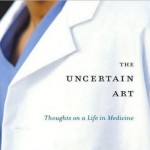 The bureaucratization of medicine with increasingly complex rules, codes, algorithms, prompts, bylaws, schedules, and administrative structure is leaving its mark, but medicine at its fundamental is still about suffering, healing, and comforting; it is about individuals; it is about relationships and trust; it is about stories. Read more
The bureaucratization of medicine with increasingly complex rules, codes, algorithms, prompts, bylaws, schedules, and administrative structure is leaving its mark, but medicine at its fundamental is still about suffering, healing, and comforting; it is about individuals; it is about relationships and trust; it is about stories. Read more
Patient safety and corporate profits
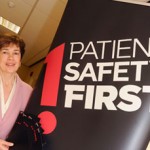 A corporate board, on the other hand — whether it governs a hospital, a pharmaceutical company or an insurance giant — is legally required to give priority to stock holders over patients. When it comes to matters of health – which is to say life, death, and disability – it seems obvious to me that corporate boards are the least desirable level at which decisions about patient safety should be made. Decisions like increasing product sales at the expense of patient safety.
A corporate board, on the other hand — whether it governs a hospital, a pharmaceutical company or an insurance giant — is legally required to give priority to stock holders over patients. When it comes to matters of health – which is to say life, death, and disability – it seems obvious to me that corporate boards are the least desirable level at which decisions about patient safety should be made. Decisions like increasing product sales at the expense of patient safety.
Read more
The emotional burdens of patient care
 How are we to protect ourselves from the emotional hazards of the practice of medicine? How are we to stand with our patients through the very worst while avoiding depression, significant stress reactions, and even substance abuse or addiction? Read more
How are we to protect ourselves from the emotional hazards of the practice of medicine? How are we to stand with our patients through the very worst while avoiding depression, significant stress reactions, and even substance abuse or addiction? Read more
Guest post: A sound mind in a disintegrating body
 In order to attain the corpore sano required by today’s fanatical health and hotness community you have to devote two or three hours a day to honing the body beautiful so that it contains no lumps, bra overhang or bits that have to be sucked in when you walk past a mirror. This involves lunges, squats, curls, lat pulldowns, pushups, bench presses and eventual death from exhaustion unless you are of that rare elite who are truly in The Zone. Read more
In order to attain the corpore sano required by today’s fanatical health and hotness community you have to devote two or three hours a day to honing the body beautiful so that it contains no lumps, bra overhang or bits that have to be sucked in when you walk past a mirror. This involves lunges, squats, curls, lat pulldowns, pushups, bench presses and eventual death from exhaustion unless you are of that rare elite who are truly in The Zone. Read more
There’s more to life than the pursuit of health
 The obsessive pursuit of health is itself unhealthy. We can locate ourselves at the enjoyment of health end of the spectrum or we can pursue disease. There are many influences in our lives that lead us unconsciously to pursue disease. To consciously choose the enjoyment of health we must recognize and resist these influences. Read more
The obsessive pursuit of health is itself unhealthy. We can locate ourselves at the enjoyment of health end of the spectrum or we can pursue disease. There are many influences in our lives that lead us unconsciously to pursue disease. To consciously choose the enjoyment of health we must recognize and resist these influences. Read more
From healthism to overdiagnosis
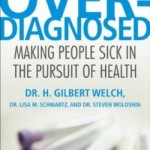 To be fair, many of these experts may be true believers, people who want to do everything they can not to miss anyone who could possibly benefit from diagnosis. But the fact that there is so much money on the table may lead them to overestimate the benefits and ignore the harms of overdiagnosis. These decisions affect too many people to let them be tainted by the businesses that stand to gain from them. Read more
To be fair, many of these experts may be true believers, people who want to do everything they can not to miss anyone who could possibly benefit from diagnosis. But the fact that there is so much money on the table may lead them to overestimate the benefits and ignore the harms of overdiagnosis. These decisions affect too many people to let them be tainted by the businesses that stand to gain from them. Read more
Megan McArdle: Why are there no new antibiotics?
 She goes on to discuss some of the issues involved in getting pharmaceutical companies to develop desparately needed new antibiotics. In particular, she explains the need to create a stockpile of new antibiotics that everyone will agree not to use for many years. (If we did use them, resistance would develop almost immediately.) This will mean some people (thousands? tens of thousand?) will die during the waiting period, when they could have lived. (Good luck on that one.) Someone (the government? foundations?) must agree to pay the pharmaceutical companies for all those years of waiting. And the US – for various reasons – will have to do this first. Read more
She goes on to discuss some of the issues involved in getting pharmaceutical companies to develop desparately needed new antibiotics. In particular, she explains the need to create a stockpile of new antibiotics that everyone will agree not to use for many years. (If we did use them, resistance would develop almost immediately.) This will mean some people (thousands? tens of thousand?) will die during the waiting period, when they could have lived. (Good luck on that one.) Someone (the government? foundations?) must agree to pay the pharmaceutical companies for all those years of waiting. And the US – for various reasons – will have to do this first. Read more
Joseph Stiglitz on inequality
 The top 1 percent have the best houses, the best educations, the best doctors, and the best lifestyles, but there is one thing that money doesn’t seem to have bought: an understanding that their fate is bound up with how the other 99 percent live. Throughout history, this is something that the top 1 percent eventually do learn. Too late. Read more
The top 1 percent have the best houses, the best educations, the best doctors, and the best lifestyles, but there is one thing that money doesn’t seem to have bought: an understanding that their fate is bound up with how the other 99 percent live. Throughout history, this is something that the top 1 percent eventually do learn. Too late. Read more
Are the most heavily marketed drugs the least beneficial?
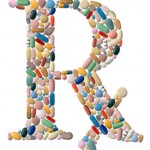 In a perfect world, doctors would not prescribe – and patients would not take – drugs that do more harm than good. But it’s complicated. The benefits and harms of drugs are determined in randomized, controlled clinical trials. For many reasons, the outcomes of such trials may not provide doctors with the information they need to decide who should take what. Read more
In a perfect world, doctors would not prescribe – and patients would not take – drugs that do more harm than good. But it’s complicated. The benefits and harms of drugs are determined in randomized, controlled clinical trials. For many reasons, the outcomes of such trials may not provide doctors with the information they need to decide who should take what. Read more
Down so low we dare not speak
 The reason pessimists are multiplying is that we dishonor the intellect and the knowledge of history in this country by refusing to admit that corruption is the source of our ills. It takes no great mental effort to realize that there’s no effective political forces either in Washington or locally that are able to do anything serious to correct our self-delusions about being the world’s policeman, because any sensible solution would seriously cut into profits of this or that interest group. Read more
The reason pessimists are multiplying is that we dishonor the intellect and the knowledge of history in this country by refusing to admit that corruption is the source of our ills. It takes no great mental effort to realize that there’s no effective political forces either in Washington or locally that are able to do anything serious to correct our self-delusions about being the world’s policeman, because any sensible solution would seriously cut into profits of this or that interest group. Read more
Breaking the self-destructive meritocratic spell
 The problem in America is not that a minority has grown super rich, but that for decades now, it has done so to the detriment of the lower social classes. The big question is: why does the majority in a seemingly free society tolerate this, and even happily vote against its own economic interests? A plausible answer is that it is under a self-destructive meritocratic spell … Rather than move towards greater fairness and egalitarianism, it promotes a libertarian gospel of the free market with minimal regulation, taxation, and public safety nets. What would it take to break this spell? Read more
The problem in America is not that a minority has grown super rich, but that for decades now, it has done so to the detriment of the lower social classes. The big question is: why does the majority in a seemingly free society tolerate this, and even happily vote against its own economic interests? A plausible answer is that it is under a self-destructive meritocratic spell … Rather than move towards greater fairness and egalitarianism, it promotes a libertarian gospel of the free market with minimal regulation, taxation, and public safety nets. What would it take to break this spell? Read more
What Wisconsin hath wrought
 It’s time to focus on the corporate CEOs and speculators. … “In U.S. states facing a budget shortfall, revenues from corporate taxes have declined $2.5 billion in the last year. In Wisconsin, two-thirds of corporations pay no taxes, and the share of state revenue from corporate taxes has fallen by half since 1981.” The same is true in other states. These facts must be stressed, repeatedly and aggressively, if the debate is going to shift from cuts in public services and education to demands for fair taxes and the revenues necessary for services and schools. Read more
It’s time to focus on the corporate CEOs and speculators. … “In U.S. states facing a budget shortfall, revenues from corporate taxes have declined $2.5 billion in the last year. In Wisconsin, two-thirds of corporations pay no taxes, and the share of state revenue from corporate taxes has fallen by half since 1981.” The same is true in other states. These facts must be stressed, repeatedly and aggressively, if the debate is going to shift from cuts in public services and education to demands for fair taxes and the revenues necessary for services and schools. Read more
It’s cheaper to let the sick die
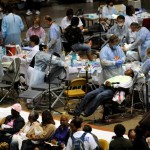 Unfortunately, he [Gawande] dismisses what, from the standpoint of reducing total health-care expenditures, is the single most serious drawback to such an approach; namely, the probability that effectively case-managed patients will survive longer than they would without intensive ambulatory care and will thereby offset their reduced frequency of hospitalization with an increase in their time at risk. If an intervention reduces a patient’s frequency of hospitalization from ten admissions annually to five, but simultaneously increases that patient’s survival from one year to two, the intervention is fully justified medically but is a wash from a cost perspective. If it increases that patient’s survival to two years and one month, it’s a net liability. Read more
Unfortunately, he [Gawande] dismisses what, from the standpoint of reducing total health-care expenditures, is the single most serious drawback to such an approach; namely, the probability that effectively case-managed patients will survive longer than they would without intensive ambulatory care and will thereby offset their reduced frequency of hospitalization with an increase in their time at risk. If an intervention reduces a patient’s frequency of hospitalization from ten admissions annually to five, but simultaneously increases that patient’s survival from one year to two, the intervention is fully justified medically but is a wash from a cost perspective. If it increases that patient’s survival to two years and one month, it’s a net liability. Read more
Complaints about pharma go way back … to ancient Rome
 In 1911 the medical profession complained of the “commercialization” of medicine, contending that this led to abuses in pharmacology and the practice of medicine. The Romans failed to check these abuses, which increased as Rome declined. “[I]f we are to avoid such unfortunate deterioration in our own time, we must not shrink from recognizing and resisting the evils which do so easily beset commercialized ages like those of the first and twentieth centuries A. D.” Read more
In 1911 the medical profession complained of the “commercialization” of medicine, contending that this led to abuses in pharmacology and the practice of medicine. The Romans failed to check these abuses, which increased as Rome declined. “[I]f we are to avoid such unfortunate deterioration in our own time, we must not shrink from recognizing and resisting the evils which do so easily beset commercialized ages like those of the first and twentieth centuries A. D.” Read more
Don’t drink and judge: Bitter tastes and moral disgust
 Although the mechanisms linking taste and behaviour are not yet clear, the authors [of the study] ask whether jurors should avoid bitter tastes and whether food preferences play a role in shaping political ideals. Read more
Although the mechanisms linking taste and behaviour are not yet clear, the authors [of the study] ask whether jurors should avoid bitter tastes and whether food preferences play a role in shaping political ideals. Read more
Overdiagnosed and overprotected children
 We have to really listen and think about why a child is telling us something. The behaviour of children and young people is fundamental to a well-functioning society, because they can tell us what is going on more honestly than we tell ourselves. Read more
We have to really listen and think about why a child is telling us something. The behaviour of children and young people is fundamental to a well-functioning society, because they can tell us what is going on more honestly than we tell ourselves. Read more
Why do we feel bad about the way we look?
 How did ordinary women and men with ordinary lives and ordinary bodies learn that they need plastic? The answer: the plastic ideological complex, a set of cultural texts that are both highly contested and yet tightly on message. It is itself so ubiquitous that it might even be described as hegemonic. In other words, the “need” for cosmetic procedures is impossible to avoid. Through advertising and TV shows, movies and magazines, we learn to want cosmetic intervention in our aging faces and imperfect bodies. This need is now so firmly implanted in our cultural psyche that it has become “common sense” to embrace cosmetic procedures. Read more
How did ordinary women and men with ordinary lives and ordinary bodies learn that they need plastic? The answer: the plastic ideological complex, a set of cultural texts that are both highly contested and yet tightly on message. It is itself so ubiquitous that it might even be described as hegemonic. In other words, the “need” for cosmetic procedures is impossible to avoid. Through advertising and TV shows, movies and magazines, we learn to want cosmetic intervention in our aging faces and imperfect bodies. This need is now so firmly implanted in our cultural psyche that it has become “common sense” to embrace cosmetic procedures. Read more
Doctors eliminate the middle man: Insurance
 The real beauty of direct-pay primary care is not only that it’s attractive to patients. It can be a way for struggling primary care physicians to maintain a financially viable practice. The average patient pays $700 to $800 a year for membership. According to a report from Kaiser Health News, this is three times more than a doctor makes for each patient in an insurance-based practice. Not to mention the extra time and the absence of aggravation that comes when doctors eliminate insurance companies. Read more
The real beauty of direct-pay primary care is not only that it’s attractive to patients. It can be a way for struggling primary care physicians to maintain a financially viable practice. The average patient pays $700 to $800 a year for membership. According to a report from Kaiser Health News, this is three times more than a doctor makes for each patient in an insurance-based practice. Not to mention the extra time and the absence of aggravation that comes when doctors eliminate insurance companies. Read more
Daniel T. Rodgers on equality and inequality
 Rawls’s cautious, prudential argument for equality could not be uncoupled in the minds of conservative intellectuals from their distress at the new affirmative action projects, their anger at busing for racial equalization, and their recoil from the gender-blurring prospects of the Equal Rights Amendment. The once common distinction between equality of opportunity and the (dangerous) passion for equality of results fused into a general criticism of equality-driven politics in all its forms. Freedom, merit, and excellence: these, not equality, were the aims of the good society. Michael Novak put the conservative consensus succinctly in 1990: “The rage for equality is a wicked project.” Read more
Rawls’s cautious, prudential argument for equality could not be uncoupled in the minds of conservative intellectuals from their distress at the new affirmative action projects, their anger at busing for racial equalization, and their recoil from the gender-blurring prospects of the Equal Rights Amendment. The once common distinction between equality of opportunity and the (dangerous) passion for equality of results fused into a general criticism of equality-driven politics in all its forms. Freedom, merit, and excellence: these, not equality, were the aims of the good society. Michael Novak put the conservative consensus succinctly in 1990: “The rage for equality is a wicked project.” Read more
Surgery at a deep discount
 Medicine is a profession. Economically, it’s sufficiently different from other marketplace transactions that it shouldn’t be run as a for-profit business. When I made that argument in a recent post, I mentioned: “The health care market is basically not price competitive – a patient contemplating brain surgery is not going to be tempted by a surgeon offering a deep discount.” That may still be true of brain surgery, but it’s obviously not true of plastic surgery. Read more
Medicine is a profession. Economically, it’s sufficiently different from other marketplace transactions that it shouldn’t be run as a for-profit business. When I made that argument in a recent post, I mentioned: “The health care market is basically not price competitive – a patient contemplating brain surgery is not going to be tempted by a surgeon offering a deep discount.” That may still be true of brain surgery, but it’s obviously not true of plastic surgery. Read more
Ezra Klein on inequality
 Whatever our eventual conclusions on inequality, we’re going to have trouble acting on them if the political system can’t bring itself to care about the average American a little bit more. … We at least need to recognize what it is that we keep doing: green-lighting the policies that make the rich richer or, in the case of the crisis, keep them rich, while dithering and drifting on the problems and needs of the vast middle. Read more
Whatever our eventual conclusions on inequality, we’re going to have trouble acting on them if the political system can’t bring itself to care about the average American a little bit more. … We at least need to recognize what it is that we keep doing: green-lighting the policies that make the rich richer or, in the case of the crisis, keep them rich, while dithering and drifting on the problems and needs of the vast middle. Read more
Are hospitals too chaotic to be safe?
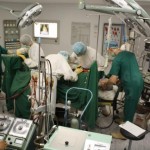 Despite the increasing understanding that clinicians routinely ignore alarms due to noise fatigue and their perceived nuisance, more vendors of monitoring equipment have responded by making their alarms louder or more irksome, hoping to out-compete related equipment by ensuring their alarm gets attention. Yet equipment alarms are not equally important and there is currently no system that prioritizes disparate alarms. Additionally, there is no incentive for a given vendor to work with its peers on this problem. The result is an “arms race” mentality that is fundamentally detrimental to the quality of patient care. Read more
Despite the increasing understanding that clinicians routinely ignore alarms due to noise fatigue and their perceived nuisance, more vendors of monitoring equipment have responded by making their alarms louder or more irksome, hoping to out-compete related equipment by ensuring their alarm gets attention. Yet equipment alarms are not equally important and there is currently no system that prioritizes disparate alarms. Additionally, there is no incentive for a given vendor to work with its peers on this problem. The result is an “arms race” mentality that is fundamentally detrimental to the quality of patient care. Read more

